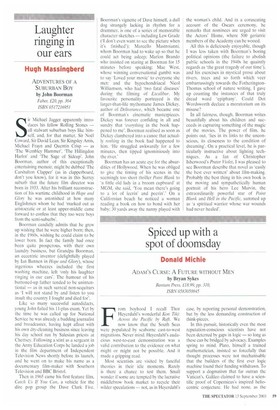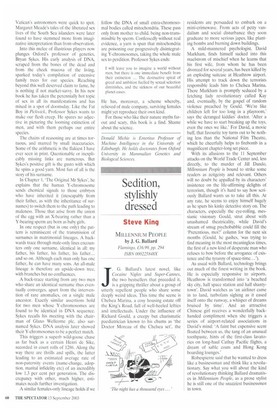Spiced up with a spot of doomsday
Donald Michie
ADAM'S CURSE: A FUTURE WITHOUT MEN by Bryan Sykes Bantam Press, £18.99, pp. 310, ISBN 0583050045 From boyhood I recall Thor Heyerdahl's wonderful K011 Tiki: Across the Pacific by Raft. We now know that the South Seas were populated by seaborne east-to-west migrations. Never mind. Heyerdahl's audacious west-to-east demonstration was a valid contribution to the evidence on what might or might not be possible. And it made a gripping read.
Most scientists are visited by fanciful theories in their idle moments. Rarely is there a chance to test them. Small wonder if some are tempted by the lucrative middlebrow book market to recycle their wilder speculations — not, as in Heyerdahl's case, by reporting personal demonstration, but by the less demanding construction of think-pieces.
In this pursuit, historically even the most reputation-conscious scientists have not been deterred by gaps in logic — so long as these can be bridged by advocacy. Examples spring to mind. Plato, himself a trained mathematician, insisted so forcefully that thought processes were not mechanisable that the builders of the first ever logic machine found their funding withdrawn. To support a dogmatism that far outran the Vatican's. Galileo claimed to have a scientific proof of Copernicus's inspired heliocentric conjecture. He had none, as the Vatican's astronomers were quick to spot. Margaret Meade's tales of the liberated sex lives of the South Sea islanders were later found to have stemmed more from imaginative interpretation than from observation.
Into this melee of illustrious players now plunges Oxford's professor of genetics, Bryan Sykes. His early analysis of DNA, scraped from the bones of the dead and from the cheek mucosa of the living, sparked today's compilation of extensive family trees for our species. Reaching beyond this well deserved claim to fame, he is nothing if not market-savvy. In his new book he has taken the perennially hot topic of sex in all its manifestations and has mixed in a spot of doomsday. Like the Fat Boy in Pickwick, Professor Sykes wants to make our flesh creep. He spares no adjective in picturing the looming extinction of men, and with them perhaps our entire species.
The chains of reasoning are at times tortuous, and marred by small inaccuracies. Some of the arithmetic is the flakiest I have ever seen in print. Questionable or inexplicably missing links are numerous. But Sykes's positive gift is the gusto with which he spins a good yarn. Most fun of all is the story of his surname.
In Chapter 1, The Original Mr Sykes', he explains that the human Y-chromosome sends chemical signals to those embryos who have inherited it (inescapably from their father, as with the inheritance of surnames) to switch them to the path leading to maleness. Those that arise from the union of the egg with an X-bearing rather than a Y-bearing sperm are born as baby girls.
In one respect (but in one only) the pattern is reminiscent of the transmission of surnames in matrimonial lineages. A backwards trace through male-only lines encounters only one surname, identical in all: my father, his father, his father, his father... and so on. Although each man only has one father, he can have many sons. An all-male lineage is therefore an upside-down tree, with branches but no confluences.
A back-trace starting from any two men who share an identical surname thus eventually converges, apart from the intervention of rare anomalies, on a single male ancestor. Exactly similar assertions hold for two men whose Y-chromosomes are found to be identical in DNA sequence. Sykes recalls his meeting with the chairman of Glaxo Wellcome plc, also surnamed Sykes. DNA analysis later showed their Y-chromosomes to be a perfect match.
This triggers a superb wild-goose chase as far back as a certain Henri de Sike, recorded in court rolls of 1286. Along the way there are thrills and spills, the latter leading to an estimated average rate of non-paternity events (name-change, adoption, marital infidelity etc) of an incredibly low 1.3 per cent per generation. The discrepancy with other, much higher, estimates needs further investigation.
A similar females-only lineage holds if we follow the DNA of small extra-chromosomal bodies called mitochondria. These pass only from mother to child, being non-transmissible by sperm. Confessedly without real evidence, a yarn is spun that mitochondria are poisoning our progressively disintegrating Y-chromosomes, taking the whole male sex to perdition. Professor Sykes ends:
I will leave you to imagine a world without men, hut there is one immediate benefit from their extinction ... The destructive spiral of greed and ambition fuelled by sexual selection diminishes, and the sickness of our beautiful planet eases.
He has, moreover, a scheme whereby, relieved of male company, surviving females might yet reproduce their own kind.
For those who like their nature myths farout and scary, this book is a find. Shame about the science.
Donald Michie is Emeritus Professor of Machine Intelligence in the University of Edinburgh. He holds doctorates from Orford University in Mammalian Genetics and Biological Sciences.



























































































 Previous page
Previous page